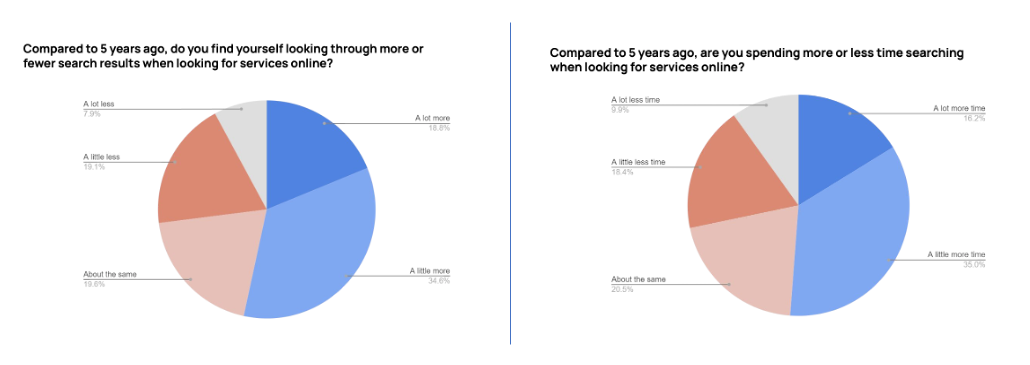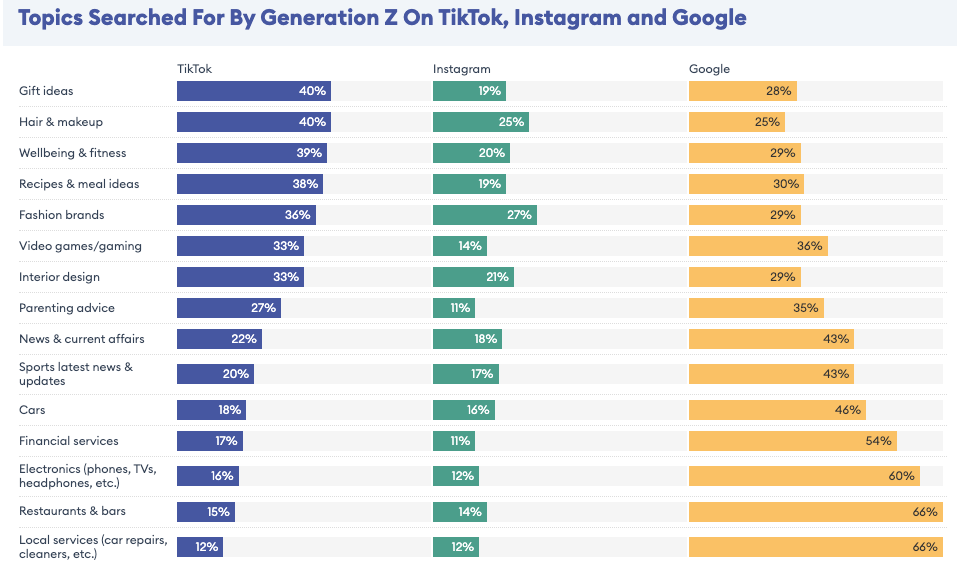Search Frustration Growing, AIOs Disappearing, GenZ Socializing

Survey: Search Frustrations Growing
A new survey from Scorpion, conducted by Dynata (h/t SEL), paints a picture of growing user frustration with "search." The survey of 1,000 US adults was conducted earlier this year. According to the findings, 79% of searchers are looking at more results than 5 years ago. In addition, 51% of respondents say that searches are taking longer than in the past; and nearly half (46%) sometimes question the "credibility" of search results. These users also express concerns about search relevance and the "amount of information [they have] to filter" in the SERP. We previously discussed how this cognitive load is one reason some younger users are substituting social for search (see below). The good news for Google is that, while 87% distinguish ads from organic results, 53% are more receptive to ads than in the past. However, 37% said they thought search engines were making it tougher to "identify ads." Overall the survey confirms the importance of ranking high in the SERP – notwithstanding growing frustrations and skepticism. The survey also reinforces the role of brands in consumer decision-making: "1 in 3 consumers seek familiar names first in SERPs."

Our take:
- Surveys often reflect perceptions and attitudes more than behavior. At a minimum, however, this suggests a decline in search confidence.
- It also reflects user ambivalence. The findings are nuanced but clearly show frustration and areas of vulnerability for Google.
- We haven't seen a survey to date that addresses the anecdotal discussion of search quality decline – until this one.
AIO Disappearing Act
When SGE was in Labs, several studies found AI Overviews were appearing for between 80% and 90% of queries. That number went down after Google took SGE out of labs. And following the embarrassing AI Overview gaffes of the past couple weeks, Google has further reduced their visibility – though it varies by vertical. According to BrightEdge, in the aggregate, fewer than 15% of keywords now generate AI Overviews, which is down from 84% during the labs period. And SEO Clarity has seen something similar: "AIO in keywords submitted by our enterprise-level clients went from 17% before the Google announcement about re-engineering AIO to about 2.5% yesterday." In local, as far as we can tell, there are no AI Overviews being shown. This retreat is somewhat analogous to Google's shutdown of Gemini images following a series of embarrassing and strange episodes and "problematic performance." Separately, SEO Lily Ray observed that the links in AI Overviews are often "dead sites, low quality sites, spammy AI content, biased/salesy content, content lacking E-E-A-T on YMYL topics, international sites, parked domains, and a random Reddit/Quora post from 12 years ago."

Our take:
- Google strongly defended itself in responding to AI Overview criticism from the industry and the press.
- Google AI Overviews were created in response to competitive pressure rather than a strong product vision. Many people would be happy if they simply went away but they appear "here to stay" – at least in some form.
- Google will probably maintain reduced AIO visibility for the foreseeable future until it can fix the egregious errors and its PR vulnerability is reduced.
Study: GenZ Uses Google 25% Less
A recent SOCi survey found that Google was the #3 choice among 18 - 24 year olds for local business discovery. Instagram and TikTok, in that order, bested Google. This is consistent with Google's internal research, other surveys and anecdotal reports. Now a new study (n=2,000) from Forbes Advisor and Talker Research affirms the SOCi findings, pointing to increasing use of social media as a Google alternative for GenZ. Google remains dominant across the general population, but usage is ebbing for younger users. Among the Forbes findings, GenZ uses Google 25% less than GenX. There was also a 30% gap in Google use for brand lookups by GenZ vs. Baby Boomers. Here, TikTok was preferred to Instagram for certain categories of business search. Google remains dominant for service business queries and restaurant searches. In terms of the "why," 29% of respondents said they "opt to search on social media primarily for convenience" because they're already the platform in question. In addition, "22% of respondents favor social media for its quick results and the engaging nature of its content, particularly videos, over text-based articles."

Our take:
- This survey adds to the growing body of evidence that younger users are defecting from Google in certain search categories.
- Google's desire to win these users back is partly why we have more social content in search (hidden gems/forums), as well as more video.
- The logic of searching on a platform you're already using equally applies to ChatGPT. If you're using it for work, it's easy to just conduct the search there.
Recent Analysis
- Local Search Implications of the Google API Leak, by David Mihm.
- Crazy Google Local Near-Me Test, by Mike Blumenthal.
- Near Memo episode 160: Rand Fishkin interview: The importance of the the Google Search Leak
Short Takes
- More local reflections on the Google Search API leak.
- Google Maps to store location history on device, not in cloud.
- GBP adding WhatsApp to replace Google Google Business Chat.
- Moz search scientist: SEO is in crisis.
- How Retrieval Augmented Generation (RAG) works vs. hallucination.
- Enhittification: Google News has been in decline for over a year.
- Google expands NotebookLLM availability and adds new features.
- Inside Canva's wildly successful SEO strategy (and execution).
- Profits over safety and ethics: OpenAI is the new Facebook.
- Google must face $16B advertiser UK lawsuit over "self-preferencing"
- Nvidia passes Apple to become 2nd most valuable company.
- Google WILL continue to index non-mobile friendly sites.
- Perplexity Pages are showing up in Google AIOs and Featured Snippets.
Listen to our latest podcast.

How can we make this better? Email us with suggestions and recommendations.

